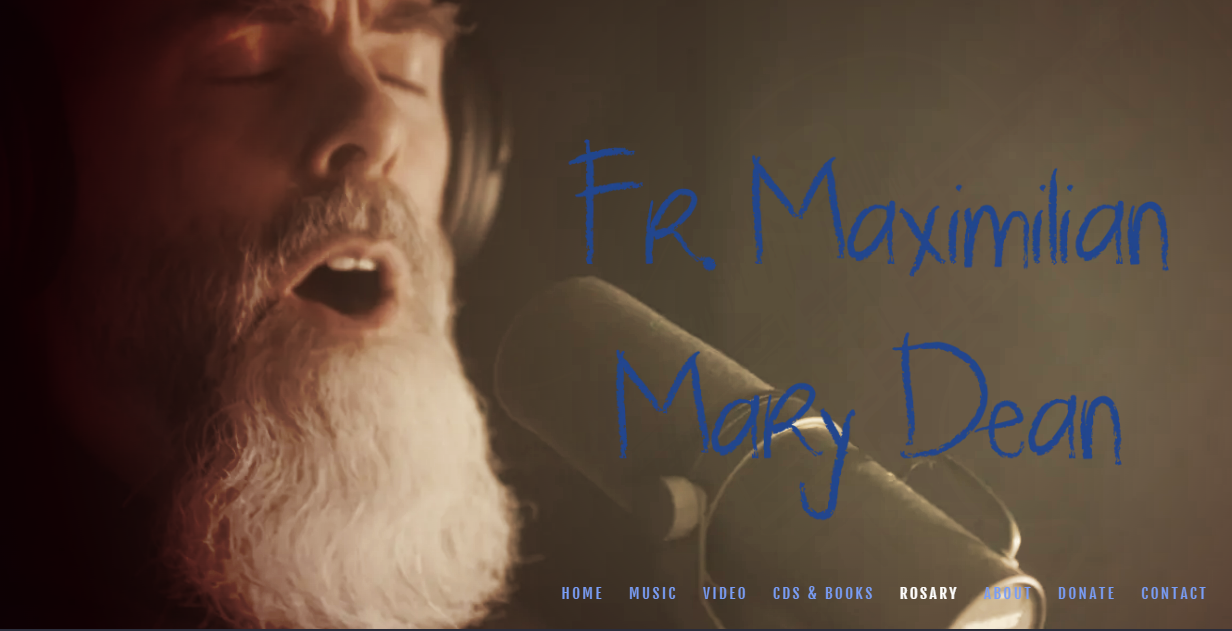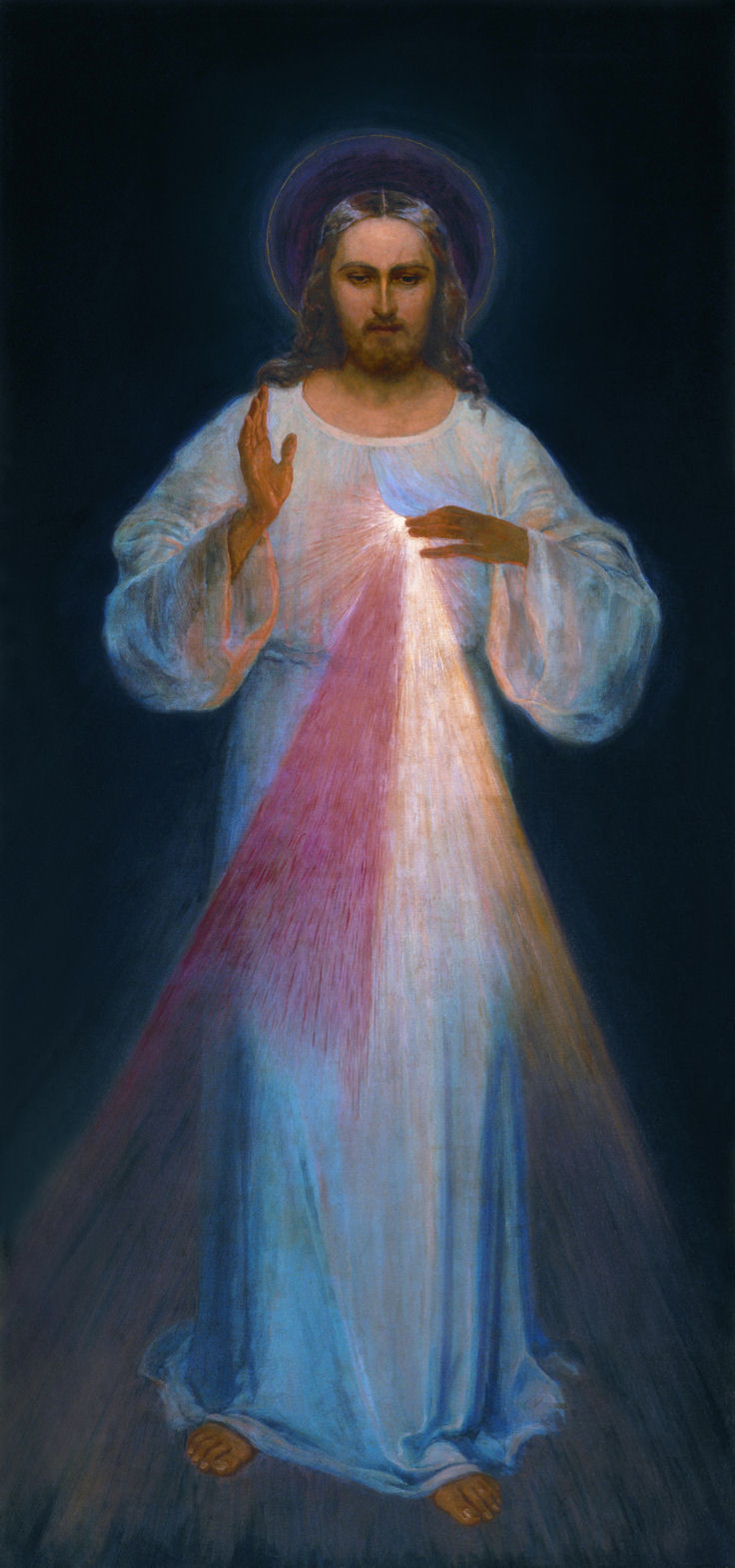54-Day Rosary Novena for Mercy
To Implore God's Mercy on Our Families and Nation
Pray the Rosary Daily
from Ash Wednesday to Feast of Divine Mercy
(February 18 to April 12, 2026)
We invite you to join us in praying the 54-Day Rosary Novena of Mercy from Ash Wednesday, February 18, through the Feast of Divine Mercy, Sunday, April 12, 2026.
See below for more information about the Extraordinary Graces available to us on the Feast of Divine Mercy.
Commit to Pray the Rosary Novena
The 54-Day Rosary Novena in Song

Join in praying this Novena for our families and our nation with the music of Fr. Maximilian Mary Dean (Fr. Maximilian Mary of Jesus Crucified), a hermit priest who has put together a beautiful recording of the 54-Day Rosary Novena. For more details visit his website.
- Learn about the Power of the Holy Rosary
-
Prayer to Our Lady, the Immaculate Virgin, Patroness of America
Scroll down for information about The Divine Mercy Novena
The Feast of The Divine Mercy

The Feast of The Divine Mercy, also known as Divine Mercy Sunday, is the Second Sunday of Easter (the Sunday immediately following Easter Sunday). You may know that Easter is the most important feast day of the year, but you may not know that we actually celebrate it over eight full days, which is why we call it the “Octave of Easter.” Moreover, it is the last day of an octave, the eighth day, which is the greatest of all, the climax of the whole feast. Fittingly, Jesus promised to give great graces on Divine Mercy Sunday. Specifically, He told St. Faustina:
On that day [Divine Mercy Sunday], the very depths of My tender mercy are opened. I pour out a whole ocean of graces upon those souls who approach the fount of My mercy. … On that day all the divine floodgates through which graces flow are opened (Diary, 699).
Regarding the graces of Divine Mercy Sunday, Jesus told St. Faustina, “The soul that will go to Confession and receive Holy Communion shall obtain complete forgiveness of sins and punishment” (699).
This is an extraordinary promise! This is because when we normally go to Confession, the eternal punishment due to sin (ie, hell) is removed, but the temporal punishment due to sin (ie, purgatory) may still remain (see Psalm 99:8). Unless we have perfect contrition, or pray, fast, and/or give alms with perfect purity of intention, temporal punishment as a consequence of our sins most likely remains. But all sins and punishment are removed by the grace of Divine Mercy Sunday when we fulfill the conditions of a valid Confession and worthily receive Holy Communion, as long as we have some rectification of the will (meaning that we are sorry and will try to amend our life).
The Divine Mercy Novena
In Preparation for
The Feast of The Divine Mercy,
(Divine Mercy Sunday)
Jesus to Saint Faustina:
"My daughter, tell the whole world about My inconceivable mercy. I desire that the Feast of Mercy be a refuge and shelter for all souls, and especially for poor sinners. On that day the very depths of My tender mercy are open. I pour out a whole ocean of graces upon those souls who approach the Fount of My mercy.” (Diary, no. 699)
Information about the Extraordinary Graces available to us
on the Feast of Divine Mercy Sunday
The Complete Remission of all Sins and Punishment
The Feast of The Divine Mercy, also known as Divine Mercy Sunday, is the Second Sunday of Easter (the Sunday immediately following Easter Sunday).
You may know that Easter is the most important feast day of the year, but you may not know that we actually celebrate it over eight full days, which is why we call it the “Octave of Easter.” Moreover, the last day of an octave, the eighth day, is the greatest of all, the climax of the whole feast.
Fittingly, Jesus promised to give great graces on Divine Mercy Sunday. Specifically, He told St. Faustina:
"On that day [Divine Mercy Sunday], the very depths of My tender mercy are opened. I pour out a whole ocean of graces upon those souls who approach the fount of My mercy. … On that day, all the divine floodgates through which graces flow are opened (Diary, 699).
Regarding the graces of Divine Mercy Sunday, Jesus told St. Faustina,
“The soul that will go to Confession and receive Holy Communion shall obtain complete forgiveness of sins and punishment” (699).
This is an extraordinary promise! This is because when we normally go to Confession, the eternal punishment due to sin (i.e., hell) is removed, but the temporal punishment due to sin (i.e., purgatory) may still remain (see Psalm 99:8). Unless we have perfect contrition, or pray, fast, and/or give alms with perfect purity of intention, temporal punishment as a consequence of our sins most likely remains. But all sins and punishment are removed by the grace of Divine Mercy Sunday when we fulfill the conditions of a valid Confession and worthily receive Holy Communion, so long as we have some rectification of the will (meaning that we are sorry and will try to amend our life).
The Divine Mercy Image
Saint Faustina Kowalska, a Polish nun who received private revelations from Jesus about The Divine Mercy, faithfully recorded these messages in her Diary beginning in the 1930s. She was granted a vision of Jesus with His right hand lifted in a blessing, and His left hand touching His chest above His heart, from which emanated red and white rays to symbolize the blood and water which poured out from His heart at the Crucifixion:
“O Blood and Water, which gushed forth from the heart of Jesus as a fountain of mercy for us, I trust in you.”
-Opening prayer for the Divine Mercy Chaplet)
Our Lord asked that this image be painted, with the words, “Jesus, I trust in You” placed under His image, and that it be venerated throughout the world:
“I promise that the soul that will venerate this image will not perish” (Diary, 48) and “By means of this image, I will grant many graces to souls” (Diary, 742).
History of The Divine Mercy
Though the devotion spread worldwide through the years, it wasn’t until May 5, 2000, that this great Feast day was officially entered into the Church calendar, five days after Pope Saint John Paul II canonized Saint Faustina.
The Vatican decreed that the Second Sunday of Easter was to be known as Divine Mercy Sunday, and the next year, April 22, 2001, marked the first time that Divine Mercy Sunday was officially celebrated by the universal Church.
Pope St. John Paul II explains the timing of the Divine Mercy revelations, which began in the 1930s:
"This was precisely the time when those ideologies of evil, Nazism and communism were taking shape. Sister Faustina became the herald of the one message capable of off-setting the evil of those ideologies, that fact that God is mercy—the truth of the merciful Christ. And for this reason, when I was called to the See of Peter, I felt impelled to pass on those experiences of a fellow Pole that deserve a place in the treasury of the universal Church."
- Pope Saint John Paul II, Memory and Identity (2005).
The Divine Mercy Chaplet
“For the sake of His sorrowful passion,
Have Mercy on us and on the whole world.”
The Divine Mercy Chaplet was given to Saint Faustina by Jesus, with this promise:
“Encourage souls to say the chaplet which I have given you” (Diary, 1541).
“Whoever will recite it will receive great mercy at the hour of death. … Even if there were a sinner most hardened, if he were to recite this chaplet only once, he would receive grace from My infinite mercy. I desire that the whole world know My infinite mercy” (Diary, 687).
We invite you to join us in praying the Divine Mercy Chaplet Novena beginning on Good Friday, March 29, 2024.
Sign up now to receive The Divine Mercy Chaplet Novena in your inbox every day from Good Friday until April 26:
Commit to Pray the Divine Mercy Chaplet Novena
The Divine Mercy Novena
The Divine Mercy Chaplet can be said anytime, but the Lord specifically asked that it be recited as a Novena. He promised, "By this Novena (of Chaplets), I will grant every possible grace to souls."
In order to prepare ourselves for this awesome Feast of The Divine Mercy, we pray the Novena (Nine Days) of Chaplets of The Divine Mercy, each for a specific intention, as Jesus asked Saint Faustina, giving her a different intention for each day of the Novena:
Day 1 All mankind, especially sinners
Day 2 The souls of priests and religious
Day 3 All devout and faithful souls
Day 4 Those who do not believe in God and those who do not yet know Jesus
Day 5 The souls who have separated themselves from the Church
Day 6 The meek and humble souls and the souls of little children
Day 7 The souls who especially venerate and glorify His mercy
Day 8 The souls detained in purgatory
Day 9 Souls who have become lukewarm
We can make a Novena of prayer for these intentions and others by praying the Chaplet of The Divine Mercy for nine days, from Good Friday until the day before Divine Mercy Sunday.
"I desire that during these nine days you bring souls to the fountain of My mercy, that they may draw therefrom strength and refreshment and whatever grace they have need of in the hardships of life, and especially at the hour of death" (Diary, 1209).
The Divine Mercy Novena Begins on Good Friday, April 18, 2025
We invite you to join us in praying the Divine Mercy Chaplet Novena beginning on Good Friday, April 18, 2025.
Sign up now to receive The Divine Mercy Chaplet Novena in your inbox every day from Good Friday, April 18, until April 26, 2025:
Commit to Pray the Divine Mercy Chaplet Novena
The Feast of Divine Mercy is Sunday, April 27, 2025
But even for those who have not prayed the Novena beforehand, the Lord still provides abundant graces to those who celebrate the Feast of Divine Mercy.
On this powerful Feast of Divine Mercy, anything we’re requesting (petition) will be granted if it is in accordance with God’s Will, releasing temporal blessings from Heaven. Jesus requested that we attend Mass on Divine Mercy Sunday and have gone to confession beforehand.
Let us remember Jesus’ powerful words,
“Mankind will not have peace until it turns to the Fount of My Mercy" (Diary, 699)


